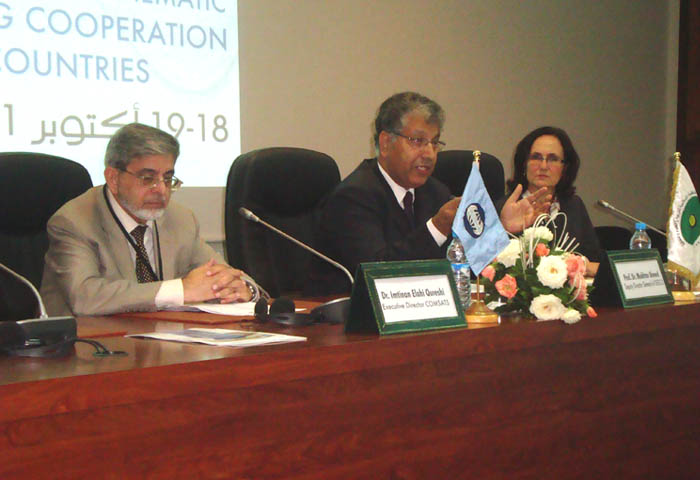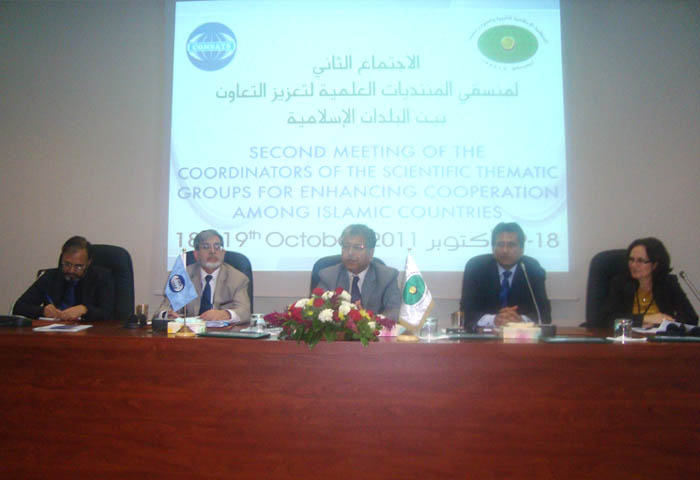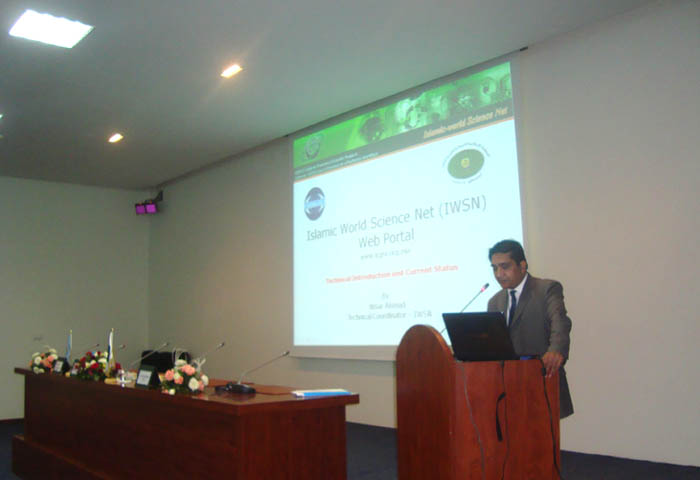COMSATS and the Islamic Educational, Scientific and Cultu ral Organization (ISESCO) jointly, organized the second International Meeting of ‘Coordinators of the Scientific Thematic Group for Enhancing Cooperation among Islamic Countries’, on 18th and 19th October 2011, at ISESCO Headquarters, in Rabat, Morocco, under COMSATS-ISESCO Cooperation Programme (2011). The meeting was continuation of COMSATS-ISESCO joint activity, ‘Islamic World Science Net (IWSN)’, launched in 2006 with an aim to promote cooperation among scientists and scientific institutions from Islamic Countries. This collaboration was further strengthened by launching of Virtual Scientific Thematic Groups in 13 areas in first meeting of the Coordinators that was held on March 10-12, 2009 in Islamabad, Pakistan.
ral Organization (ISESCO) jointly, organized the second International Meeting of ‘Coordinators of the Scientific Thematic Group for Enhancing Cooperation among Islamic Countries’, on 18th and 19th October 2011, at ISESCO Headquarters, in Rabat, Morocco, under COMSATS-ISESCO Cooperation Programme (2011). The meeting was continuation of COMSATS-ISESCO joint activity, ‘Islamic World Science Net (IWSN)’, launched in 2006 with an aim to promote cooperation among scientists and scientific institutions from Islamic Countries. This collaboration was further strengthened by launching of Virtual Scientific Thematic Groups in 13 areas in first meeting of the Coordinators that was held on March 10-12, 2009 in Islamabad, Pakistan.
The two-day meeting was attended by eminent scientists and experts from Algeria, Egypt, Morocco, Pakistan and Tunisia, who are designated Coordinators of the Virtual Scientific Thematic Groups in the fields of Renewable Energy; Water Management; Mathematics; Science & Technology Parks Management; Bio-sciences/Biotechnology and Genetic Engineering; ICTs in Science & Technology and Universities. The Inaugural Ceremony was chaired by the Deputy Director General ISESCO, Dr. Mukhtar Ahmed, along with the Executive Director COMSATS, Dr. Imtinan Elahi Qureshi, and the Head of ISESCO Centre for Promoti on of Scientific Research (ICPSR), Mrs. Wafaa El Alami.
on of Scientific Research (ICPSR), Mrs. Wafaa El Alami.
In his opening remarks, the Executive Director COMSATS,highlighted the digital divide experienced by the Islamic Countries and the need & use of science and technology to minimize this gap. He hoped that this activity will result in strengthening linkages among scientific/research organizations of the Islamic countries, in general, and formulation of specific recommendations by the Coordinators to further improve IWSN web-portal and the Virtual Scientific Thematic Group activities to consolidate efforts towards socio-economic development of the Islamic countries, in particular. He hoped that the meeting would be productive and lead to a new beginning of scientific collaboration among the Islamic countries. Dr. Qureshi also highlighted the role of COMSATS in facilitating South-South cooperation and advocating the use of S&T for achieving socio-economic progress.
Dr. Mukhtar Ahmed in his address welcomed all the Coordinators of the Groups and expressed satisfaction over the scientific cooperation between ISESCO and COMSATS. He also highlighted the important role of Coordinators in establishing a virtual network and enhancing cooperation among OIC countries.
and expressed satisfaction over the scientific cooperation between ISESCO and COMSATS. He also highlighted the important role of Coordinators in establishing a virtual network and enhancing cooperation among OIC countries.
The Workshop comprised of 5 technical sessions, and an Inaugural and a Closing Session. During the technical sessions, the Coordinators of Scientific Thematic Groups presented current status of their Thematic Groups and the plans to enhance Group activities. Mr. Tajammul Hussain (Advisor Programmes COMSATS), who is also one of the Coordinators of the Thematic Groups, highlighted the current status of IWSN, while touching upon the expected role of Coordinators. Mr. Hussain also apprised the Coordinators of the present status of membership, news updates and forum activities of the Thematic Group on “New and Renewable Energy”.
The Senior Assistant Director COMSATS, Mr. Nisar Ahmad, who is also the Technical Coordinator of IWSN, made a detailed technical presentation on the various features of IWSN, and the action plan for the year 2011. The presentation was followed by a training workshop on administrative and managerial aspects of the thematic gro/Archives/ArchiveNews/ANImages/ANImages2011/LinkID183_Second_IWSN_Thematic_Group_Meeting_Morocco_2011_Pic04.jpg) ups and were provided hands-on training to use all the features of the portal.
ups and were provided hands-on training to use all the features of the portal.
The Closing Ceremony included a Panel Discussion Session, which wasjointly chaired by Dr. Mukhtar Ahmed, Dr. Imtinan Elahi Qureshi, Mrs. Wafaa El Alami, Mr. Tajammul Hussain and Dr. Faiq Billal, the Director Science ISESCO.
The panelists showed their confidence in the efforts made by ISESCO and COMSATS for enhancing cooperation among Islamic countries through this network and appreciated the efforts of Coordinators for voluntarily taking up this responsibility. They hoped that the Thematic Groups would be able to achieve the mission set out for IWSN. All the Coordinators gave their recommendations to make the portal functional and to enhance cooperation.







